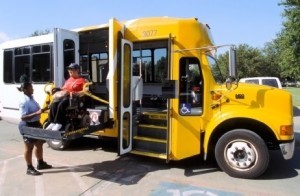We all have a role in supporting the ADA and celebrating it
by Randall Rutta, President and CEO
![]() As Easter Seals prepares to celebrate 100 years of serving people with disabilities and their families in 2019, now is a time when we, as an organization, are reflecting on how changes in medicine, societal perceptions, facilities, and technologies have influenced how we have provided supports and services. One of the biggest changes occurred just within the past quarter century with the implementation of the Americans with Disabilities Act (ADA). The ADA literally opened doors for many who, prior to the ADA, thought they would have limited opportunities for employment, higher education, regular medical care, and travel.
As Easter Seals prepares to celebrate 100 years of serving people with disabilities and their families in 2019, now is a time when we, as an organization, are reflecting on how changes in medicine, societal perceptions, facilities, and technologies have influenced how we have provided supports and services. One of the biggest changes occurred just within the past quarter century with the implementation of the Americans with Disabilities Act (ADA). The ADA literally opened doors for many who, prior to the ADA, thought they would have limited opportunities for employment, higher education, regular medical care, and travel.
In the years leading up to passage of the ADA law on July 26, 1990, Easter Seals often served as mediator and coordinator for discussions between organizations representing people with disabilities and agencies providing public service—in particular transportation operators, healthcare providers, and workforce programs.
Since 1990, Easter Seals has administered several national technical assistance projects and training programs that provide reliable, customer-focused information and education for state and local disability and service agencies. From teaching bus and rail transit employees about serving customers with disabilities to helping veterans understand their rights under the ADA as they return to civilian life, Easter Seals assists communities and individuals with understanding the importance of the ADA and how they can fulfill its purpose by eliminating discrimination against people with disabilities. Physical access and communication technologies have improved for everyone due in large part to the ADA, but the need for education, understanding, and assistance regarding the law remains. For this reason, Easter Seals continues to provide essential information and training on the basic tenets of the ADA for professionals unfamiliar with the law’s requirements or for agencies who request refresher education on implementing the ADA.
When our interns arrived at Easter Seals this summer, we noted that most of them were born several years after the signing of the ADA. They are the first generation to have grown up not remembering networks of sidewalks that ended only with sharp curbs, heavy doors on college campus buildings that could only be opened manually, or audiovisual programs with no captioning. Their enthusiasm for wanting to make a difference by supporting continued improvements and community understanding for people with physical, sensory, and cognitive disabilities encourages those of us who do remember the struggle for accessibility equality. Through our interns’ enthusiasm, we have seen that the spirit of the ADA is alive and well for this generation who’s entering the workforce in the next few years.
This July and August, as you commute to work, vacation, or enjoy a baseball game, take a moment to look around and notice the things made possible because of the Americans with Disabilities Act and consider what opportunities for improvement still exist in your community, neighborhood, and workplace. All of us have a role in supporting the ADA, and we can also take a moment to celebrate what has been accomplished. So many of the improvements originally designed for people with disabilities are helping all of us more easily connect, travel, and communicate each and every day.
On behalf of Easter Seals, Happy ADA 25th Anniversary to all who provide accessible services, programs, and facilities. Thank you!
Join our Twitter chat on the ADA tomorrow with #ADAToday so we can continue conversation and awareness about disability rights and access.
You can also see current and historical information and stories about the ADA at easterseals.com/ADA.







